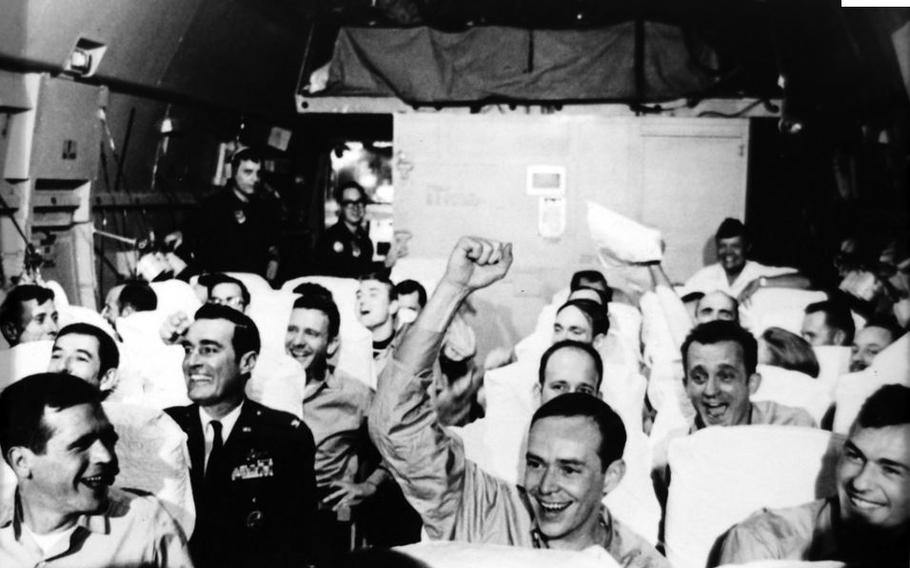
Returning prisoners of war cheer as a U.S. Air Force C-141 Starlifter takes off from Gia Lam Airport, Hanoi, for the flight to Clark Air Base in the Philippines in February 1973. (National Archives)
BATON ROUGE, La. (Tribune News Service) — On March 29, 1973, two months after the signing of the Paris Peace Accords, the last United States combat troops left South Vietnam.
To mark the occasion and honor Louisiana’s Vietnam veterans, the Vietnam War 50th Anniversary Commemoration will be held at 10 a.m. March 29 at the Raising Cane’s River Center.
According to the Louisiana Department of Veterans Affairs, the state has 85,000 Vietnam-era veterans. Speaking to them more than 50 years after leaving Southeast Asia, their recollections of the conflict, and their emotions, remain vivid.
‘A scary situation’
Larry Minton was only 22 when he turned up in the A Shau Valley, along the Laotian border, in 1968. It didn’t take long for the realities of the conflict to hit home: On his first day in combat, he watched on in horror as a helicopter was shot down.
During his year in Vietnam, he came under constant attack from mortars, rockets and snipers. He saw gunbattles that lit up the forest at night and vividly recalled one particular back-and-forth skirmish that ended with a giant hole being blown in the side of a mountain.
Later, a swap with the 101st Airborne Division saw him move to the wild Cambodian border — “real Indian country,” he said — where the threat of ambushes was ever-present.
It was a hard, dirty, tense existence. Because of a lack of water, Minton and his fellow soldiers bathed only when it rained.
Long after leaving Vietnam, Minton developed heart trouble that was most likely due to exposure from the tactical herbicide Agent Orange.
“It was pretty horrible,” he said. “It was just a scary situation for someone who wasn’t used to something like that. And I wasn’t the only one. We all felt that way.”
‘We had to do what Uncle Sam told us to do’
In October 1967, 23-year-old Vance Sutton arrived in Cam Ranh Bay as an Air Force sergeant. He ended up staying in the country for a year and a half.
Among Sutton’s most vivid memories were being hit hard during the Tet Offensive in 1968; watching a fuel dump explode; and seeing a heavily armed Douglas AC-47 Spooky heading over a hill as it dropped flares, fired red tracer bullets and let loose its powerful, Gatling-style machine guns.
During his busiest period, working on aircraft while a heavy period of bombing North Vietnam was underway, he worked seven days a week, 12 hours a day.
Some of his strongest emotions are reserved for events that took place away from the battlefield. He calls Jane Fonda a “traitor,” while his return home, in May 1969, elicits particularly painful memories.
“Coming home was terrible,” he said. “I was told it would be best for me not to wear my uniform when I got home, but I did anyway. When I arrived at the San Francisco airport, I was spat at, called a baby killer. ... They (protesters) were going to throw some red stuff on me, but security got ahold of them. That period of time was terrible for us. We didn’t get any kind of recognition at all.
“We went there because we had to. We didn’t go there because we wanted to. We had to do what Uncle Sam told us to do.”
‘You never get over it’
Kenneth Altazan is one of Louisiana’s most-decorated Vietnam War veterans. A Marine, he came away from the conflict with a slew of medals, including a Silver Star that was upgraded to a Navy Cross in 2015.
Altazan did two tours in Vietnam from 1967 to 1969.
“I was in Vietnam for 19 months and I flew every day,” he said. “I probably had the best job over there, because every time I brought somebody out of a situation, someone who’d been shot and was injured, I helped restore their chance at life. ... I was helping my fellow Marines.”
He remembers encountering, in a hospital long after the fact, a man he had rescued; though he had been badly injured, the man thanked Altazan deeply for saving his life.
On one particularly difficult mission — in Quang Nam Province on May 9, 1969 — heavy fire forced the helicopter he was in to touch down in five places to rescue stricken Marines. On the second “hop,” or touchdown, Altazan severely injured his knee while carrying an injured Marine but still managed to sprint into the line of fire one more time to rescue two more.
When he talks about the war, his heroics aren’t what he speaks about. His words are reserved for his fellow Marines and the feeling he had when he was able to help them in need.
He’s since been diagnosed with post-traumatic stress disorder. The memories of what he saw in Vietnam have never dimmed.
“You never get over it, what happened over there,” he said. “The best way I can put it is that I left Vietnam, but Vietnam never left me.”
The Louisiana Department of Veterans Affairs, East Baton Rouge Mayor-President Sharon Weston Broome and the Mayor’s Advisory Council on Veterans Affairs welcome all Vietnam veterans, their families and veteran supporters to attend the statewide Vietnam War 50th Anniversary Commemoration honoring Louisiana’s Vietnam veterans at 10 a.m., Wednesday, March 29, Vietnam War Veterans Day, at the Raising Cane’s River Center.
(c)2023 The Advocate, Baton Rouge, La.
Visit at www.theadvocate.com
Distributed by Tribune Content Agency, LLC.